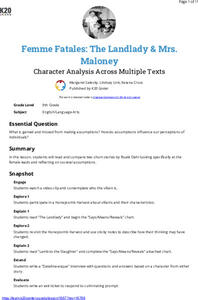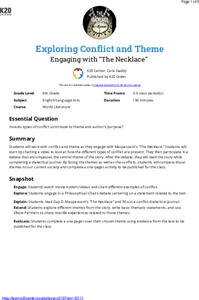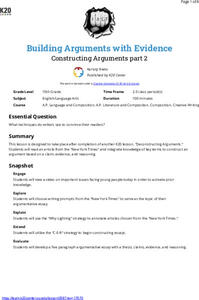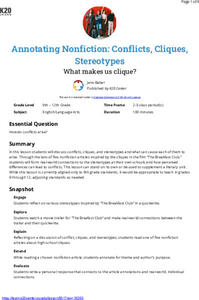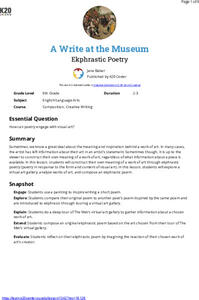K20 LEARN
From Apples To Oranges: Examining Literary Devices
Make learning the definitions of literary terms memorable with a fun and engaging activity. Teams of scholars are given several terms and create an acrostic poem with simplified definitions and examples.
K20 LEARN
Femme Fatales - The Landlady and Mrs. Maloney: Character Analysis Across Multiple Texts
Two stories by Roald Dahl, "Lamb to the Slaughter" and "The Landlady" provide readers an opportunity to compare stories by the same author. After a close reading of the stories, teams select a character from one of the tales, craft...
K20 LEARN
Ethos, Logos, Pathos: Persuading Your Audience
Ethics, emotion, reason—scholars investigate advertisers' persuasive techniques to attract buyers. After examining the techniques used in infomercials, writers craft a persuasive essay on a topic of their choice.
K20 LEARN
Diggin' Deeper - Poetry Made Relevant: Poetry And Poetic Devices
What do Beethoven, Bob Dylan, and Pharrell all have in common? Works by these three musicians are used to launch a study of poetry. Class members listen to passages from the music and craft a quick write about how the music makes them...
K20 LEARN
Brushstrokes: Communication/Using Descriptive Language
Sometimes a picture reflects a thousand descriptive words. To illustrate the importance of sensory words in descriptive writing, scholars listen to a song and craft a painting in response. After sharing their work with the class,...
K20 LEARN
Criminal Motivations: Irony and Characterization In "The Cask Of Amontillado"
Edgar Allan Poe's short story "The Cask of Amontillado" is a bit of a puzzle. Critics have long debated Montresor's motives for killing Fortunato. Young scholars examine examples of the three types of irony (verbal, dramatic, and...
K20 LEARN
Can You Tell Me Tales? Themes In Literature
"The Wife of Bath's Tale" and "The Pardoner, His Prologue, and His Tale" from Chaucer's Canterbury Tales take center stage in a lesson that asks scholars to update the tales, craft a script, and either video their version or act it out...
K20 LEARN
Exploring Conflict And Theme: Engaging With "The Necklace"
Teach young scholars how to determine the theme of a story, an insight the author wants to share with readers, with a lesson that uses Guy de Maupassant's "The Necklace" as an anchor text. Learners examine the internal and external...
K20 LEARN
Between The Lines: Inferences In The Narrative Life Of Frederick Douglass Excerpt
Good literature can be much like an iceberg requiring readers to presume that the bulk of the meaning may be inferred to be found below the surface. Here's a lesson that asks scholars to conduct a close reading of passages from The...
K20 LEARN
Blackout Poetry: Re-Envisioning Writing
Introduce young poets to Blackout Poetry. Much like Found Poems, Blackout Poetry challenges scholars to rethink the process writers may use to craft their poems. After watching a short video in which poet Austin Kleon describes his...
Overcoming Obstacles
Giving Presentations
With their action plans in place, groups now develop a presentation to get others interested in their project. Scholars learn how to present themselves during a presentation and elaborate on and add visuals to their presentation. After...
K20 LEARN
Being Mindful Of Sadness In "The Scarlet Ibis": Theme And Characterization
James Hurst's short story "The Scarlet Ibis" provides readers with an opportunity to consider how they can support others who are experiencing distress. Participants learn self-care tips and connect to the short story's characters. They...
K20 LEARN
Building Arguments With Evidence: Constructing Arguments Part 2
The second session in the two-part "Building Arguments with Evidence" lesson asks scholars to craft an argument essay on a topic of interest to them. Writers establish a claim, locate evidence, and justify their stance.
K20 LEARN
Arguing With Evidence: Deconstructing Arguments Part 1
In the first lesson in a two-part series, high schoolers pick a social issue important to them and examine an article about the topic, the arguments and evidence used to support the writer's stance, and craft two counter-arguments to the...
K20 LEARN
#Summarize: Summarizing
What are the effects of one's life experiences? Class members view a slam poetry reading, a speech by President Obama, and read a short story by John Steinbeck about responding to tragedies. They summarize these events and then craft a...
Penguin Books
Teacher's Guide: A Raisin in the Sun by Lorraine Hansberry
It's the American Dream! A house of your own, a better life, freedom to be who you want. But what happens when the dream withers? Lorraine Hansberry's award-winning drama, A Raisin in the Sun, offers some powerful answers to these...
K20 LEARN
Annotating Nonfiction - Conflicts, Cliques, Stereotypes: What Makes Us Clique?
John Hughes' The Breakfast Club takes center stage in a lesson about annotating nonfiction texts to keep track of evidence that may be used later in discussions and writings. Scholars consider the stereotypes and conflicts presented in...
K20 LEARN
A Write At The Museum: Ekphrastic Poetry
Which came first—the painting or the poem? In this case, it is the painting. Scholars closely examine a work of art and then craft an ekphrastic poem in response. A carefully scaffolded nine-page plan leads young poets through the process.
K20 LEARN
Antigone's Themes Today: The Greek Drama Antigone
Is Antigone relevant to today's readers? After reading Sophocles' tragedy, scholars must decide if the themes are universal and timeless. Class members engage in a series of activities designed to have them closely consider the...
K20 LEARN
Active Shakespeare: Making Shakespeare Accessible
Two sonnets, both alike in theme and story, break from ancient language to new glory. The prologue to Act I of Romeo and Juliet provides scholars with an opportunity to examine the language Shakespeare uses to create timeless stories....
K20 LEARN
Analyzing Literary Figures: Analyzing Literature
The author study gets an update in a research project designed for high schoolers. Scholars search for information about literary figures that connects them to their times, their works, their themes, and other writers. Researchers also...
K20 LEARN
"The Lady, Or The Tiger?" Which Do You Choose?: Internal and External Conflict
"How come there's no ending?" After a close reading of Frank R. Stockton's tale "The Lady, or the Tiger?" in which scholars examine each of the main characters' conflicts and motivations, writers craft their own ending using textual...
K20 LEARN
#Unstressed #Stressed: Shakespearean Sonnets And Iambic Pentameter
Does any word rhyme with orange? Young poets try their hand at crafting a Shakespearean sonnet by first creating list of rhyming words. They then examine the use of unstressed and stressed syllables in iambic pentameter and the rhyme...
K20 LEARN
A Stone's Throw Away - The Dangers Of Tradition: The Lottery
Shirley Jackson's short story "The Lottery" is the anchor text for a lesson that teaches young readers how to use the Tip of the Iceberg strategy to go below the surface of a tale. After reading the short story and an article about the...



